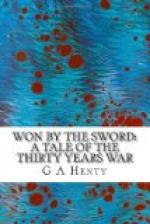The aged Spanish general, though streaming with blood from several wounds, still from his litter encouraged his soldiers, who, stern and unmoved, filled up the gaps that had been made, and undauntedly faced their foes. But the struggle could not be long continued. The square was gradually wasting away, and occupied but half the ground which it had stood upon when the battle began. And Fuentes, seeing that further resistance could only lead to the annihilation of his little band, felt that no more could be done. There were no signs of Beck coming to his assistance. Indeed the troops of that general had been met by the cavalry in their flight; these communicated their own panic to them, and such was the alarm that the division abandoned its baggage and guns and fled from the field, where their arrival might still have turned the tide of battle.
Fuentes at last ordered his officers to signal their surrender. Enghien rode forward, but, the Spanish soldiers believing that, as before, he was but leading his cavalry against them, poured in a terrible volley. He escaped by almost a miracle, but his soldiers, maddened by what they believed to be an act of treachery, hurled themselves upon the enemy. The square was broken, and a terrible slaughter ensued before the exertions of the officers put a stop to it. Then the remaining Spaniards surrendered. The battle of Rocroi was to the land forces of Spain a blow as terrible and fatal as the destruction of the Armada had been to their naval supremacy. It was indeed a death blow to the power that Spain had so long exercised over Europe. It showed the world that her infantry were no longer irresistible, and while it lowered her prestige it infinitely increased that of France, which was now regarded as the first military power in Europe.
The losses in the battle were extremely heavy. The German and Walloon cavalry both suffered very severely, while of the Spanish infantry not one man left the battlefield save as a prisoner, and fully two-thirds of their number lay dead on the ground. Upon the French side the losses were numerically much smaller. The German cavalry, after routing those of l’Hopital, instead of following up the pursuit hurled themselves upon the infantry, who broke almost without resistance. These also escaped with comparatively




